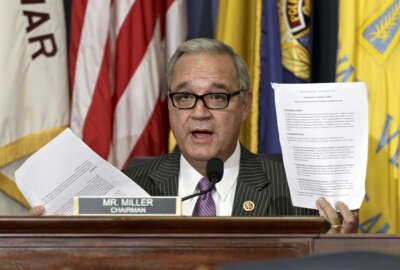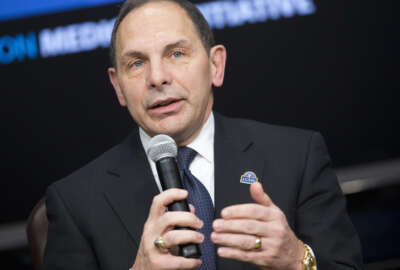
Devil’s in the details for implementing VA Commission recommendations
The Senate Veterans Affairs Committee took on the recommendations from the VA Commission on Care's recent report on veterans health care.
The Veterans Affairs Department and many members of both the House and Senate VA committees say they largely agree with the spirit and intent of the VA Commission on Care’s suggestions to reform veterans health care.
Yet, the future and success of achieving the commission’s recommendations will largely depend on a few debates over the details — and developing the right plan to set the department on a path to meet them.
“There’s hardly anything in the report that we haven’t already thought of or aren’t already doing as part of the ongoing myVA transformation efforts,” VA Secretary Bob McDonald said, during his Sept. 14 testimony before the Senate VA Committee. “We differ on some details but we wholeheartedly agree with the intent of almost all the Commission’s recommendations.”
The Senate VA Committee took a different approach to the commission’s report than its counterpart in the House. Two commission members testified before the House committee last week.
“I wish the House had allowed me the same opportunity last week, but neither I nor the veterans service organizations were invited to testify in person,” McDonald said, at the beginning of the Sept. 14 Senate hearing. The committee heard from 10 people on their views of the commission’s report.
Most disagreements stemmed from differing views over VA’s role in coordinating a system of integrated health care and the plan that the department should adopt to develop that network.
The Obama administration said earlier this month that it agreed with 15 of the commission’s 18 suggestions. The three areas where it disagreed were also sticking points for many members of Congress.
VA says it should serve as the main coordinator for such care, where the department would help veterans choose from a network of VA doctors and private providers, depending on the veteran’s needs, location and ability to access VA facilities.
“The question is how much unfettered access to the private sector do you allow the individual veteran and who takes responsibility for integrating their health care?” McDonald said. “We believe that as the VA, we need to take that responsibility.”
The department currently spends about $13.5 billion annually on veterans health care through both the Choice program and community care funding, VA Undersecretary for Health David Shulkin said.
Under its new plan, the VA said it needs roughly $17 billion for integrated health care. The commission’s plan is more expensive than that, Shulkin said.
But others on the Senate VA committee disagreed that VA should be responsible as the main care coordinator for veterans.
The commission also suggested that an 11-member board of directors oversee the Veterans Health Administration’s transformation and long-term strategies. The proposed board would have the authority to review and approve major operational and business plans, including the VHA’s budget request.
“I feel like this committee is the closest thing to a board of directors that we should have,” Sen. Thom Tillus (R-N.C.) said. “If we add that other layer … then I think we could have VA leadership that gets monthly floggings from two different groups potentially. I don’t know that that’s necessarily productive.”
Nancy Schlicting, chairwoman for the VA Commission on Care, said the board of directors would instill consistent leadership, which she said is the key to improving long culture change and transformation.
Next steps for veterans health care
Though many members of Congress and the administration can agree over the majority of the commission’s suggestions, it’s unclear when the department would be able to act on them.
“We clearly do not want this report to sit on a shelf,” Schlichting said. “We ask for your help to make our report come to life, through enabling legislation that was included that does require your action.”
Rene Campos, deputy director of government relations for the Military Officers Association of America, had a similar call to action.
“I would like to put right up front that we want to see the exhaustive work of the commission and the critical legislation proposed by the Congress and the administration be enacted this year,” she said.
House VA Committee Chairman Jeff Miller (R-Fla.) expressed a similar sentiment last week.
“This is not one that will sit on a shelf and gather dust,” he said Sept. 7. “Ignoring this opportunity would be a dereliction of our duty.”
Solutions to many of the problems the commission identified are already included several pieces of veterans legislation currently pending in both chambers of Congress.
The Senate committee, and McDonald himself, took many opportunities Wednesday to push the Veterans First Act.
“Damn, we have to get Veterans First Act passed,” Sen. Jon Tester (D-Mont.) said. “We just do.”
That bill was passed out of the Senate Veterans Affairs Committee in May and hasn’t yet made it to the Senate floor for debate.
Meanwhile, the House passed the VA Accountability First and Appeals Modernization Act, which combines provisions on new accountability and tougher disciplinary procedures with others that would modernize the veterans appeals process.
Senate VA Committee Ranking Member Richard Blumenthal (D-Conn.) introduced his own standalone version of appeals reform at a press conference Wednesday.
Copyright © 2025 Federal News Network. All rights reserved. This website is not intended for users located within the European Economic Area.
Nicole Ogrysko is a reporter for Federal News Network focusing on the federal workforce and federal pay and benefits.
Follow @nogryskoWFED
Related Stories

Obama weighs in on VA Commission’s health care suggestions





